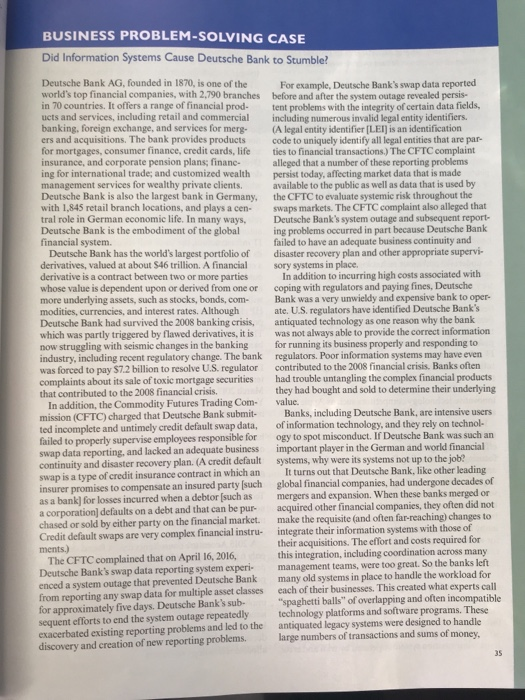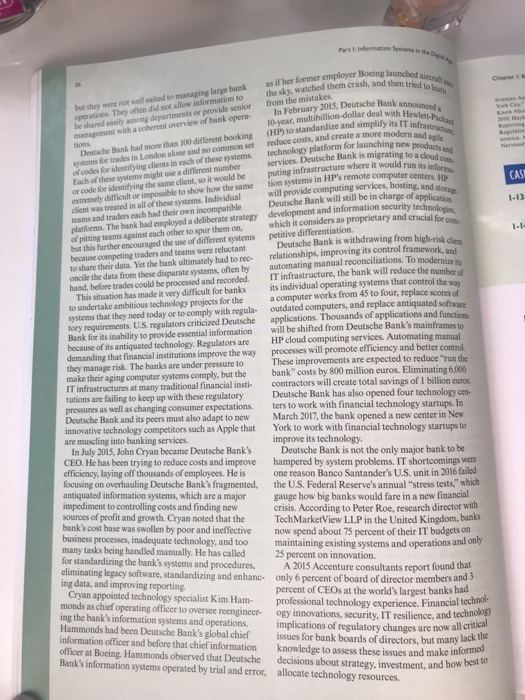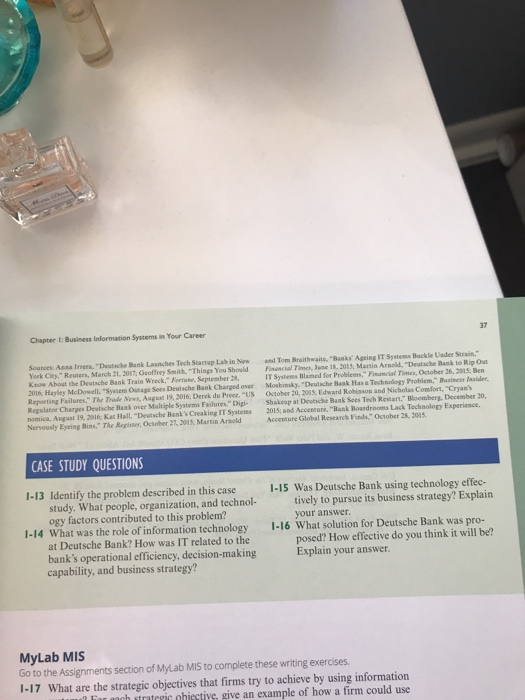BUSINESS PROBLEM-SOLVING CASE Did Information Systems Cause Deutsche Bank to Stumble? Deutsche Bank AG, founded in 1870, is one of the world's top financial companies, with 2.790 branches before and after the system outage revealed persis- in 70 countries. It offers a range of financial prod tent problems with the integrity of certain data fields, ucts and services, including retail and commercial including numerous invalid legal entity identifiers. banking, foreign exchange, and services for merg (A egal entity identifier [LEI] is an identification ers and acquisitions. The bank provides products code to uniquely identify all legal entities that are par- For example, Deutsche Bank's swap data reported r mortgages, consumer finance, credit cards, life ties to financial transactions.) The CFTC complaint insurance, and corporate pension plans; finane- ing for international trade; and customized wealth persist today, affecting market data that is made management services for wealthy private clients Deutsche Bank is also the largest bank in Germany, the CFTC to evaluate systemic risk throughout the with 1,845 retail branch locations, and plays a cen swaps markets. The CFTC complaint also alleged that tral role in German economic life. In many ways, Deutsche Bank is the embodiment of the global financial system. alleged that a number of these reporting problems available to the public as well as data that is used by Deutsche Bank's system outage and subsequent report- ing problems occurred in part because Deutsche Bank failed to have an adequate business continuity and Deutsche Bank has the world's largest portfolio of disaster recovery plan and other appropriate supervi- derivatives, valued at about $46 trillion. A financial sory systems in place derivative is a contract between two or more parties In addition to incurring high costs associated with whose value is dependent upon or derived from one or coping with regulators and paying fines, Deutsche more underlying assets, such as stocks, bonds, com Bank was a very unwieldy and expensive bank to oper- modities, currencies, and interest rates. Although Deutsche Bank had survived the 2008 banking crisis, antiquated technology as one reason why the bank which was partly triggered by flawed derivatives, it is was not always able to provide the correct information now struggling with seismic changes in the banking for running its business properly and responding to industry, including recent regulatory change. The bank regulators. Poor information systems may have even was forced to pay $7.2 billion to resolve U.S. regulator contributed to the 2008 financial crisis. Banks often complaints about its sale of toxic mortgage securities had trouble untangling the complex financial products that contributed to the 2008 financial crisi ate. U.S. regulators have identified Deutsche Bank's they had bought and sold to determine their underlying In addition, the Commodity Futures Trading Com value. mission (CFTC) charged that Deutsche Bank submit failed to properly supervise employees responsible for ogy to spot misconduct. If Deutsche Bank was such an continuity and disaster recovery plan. (A credit default systems, why were its systems not up to the job insurer promises a corporation] defaults on a debt and that can be pur acquired other financial companies, they often did not Credit default swaps are very complex financial instru- integrate their information Banks, including Deutsche Bank, are intensive users ted incomplete and untimely credit default swap data, of information technology, and they rely on technol- data reporting, and lacked an adequate business important player in the German and world financial a type of credit insurance contract in which an It turns out that Deutsche Bank, like other leading global financial companies, had undergone decades of mergers and expansion. When these banks merged or ompensate an insured party [such k) for losses incurred when a debtor [such as ased or sold by either party on the financial market. make the requisite (and often far-reaching) changes to ents.) The CFTC complained that on April 16, 2016, their acquisitions. The effort and costs required for Deutsche Bank's swap data reporting system experi- management t enced a system outage that prevented from reporting any swap data for multiple asset classes each of their businesses. This created what experts call for approximately five days. Deutsche Bank's sub- sequent efforts to end the system outage repeatedly exacerbated existing reporting problems and led to the antiquat this integration, including coordination across many many old systems in place to handle the workload for "spaghetti balls" of overlapping and often incompatible teams, were too great. So the banks left Deutsche Bank technology platforms and software programs. These ed legacy systems were designed to handie discovery and creation of new reporting problems.large numbers of transactions and sums of money, 35









